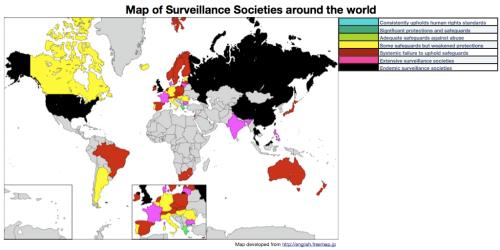Privacy International hat wieder ein internationales Datenschutz-Ranking für das Jahr 2007 veröffentlicht: The 2007 International Privacy Ranking. Deutschland ist im Vergleich zum Vorjahr vom ersten auf den siebten Platz zurück gerutscht. Schade eigentlich. Griechenland führt vor Rumänien, Ungarn, Slowenien, Portugal und Luxenburg. Der Länderreport zu Deutschland ist relativ lang geworden. Immerhin gab es eine Menge Gesetze und sonstige Vorfälle, die dazu geführt haben, dass Deutschland im Ranking abgesunken ist.

Hier ist die Zusammenfassung:
* The 2007 rankings indicate an overall worsening of privacy protection across the world, reflecting an increase in surveillance and a declining performance o privacy safeguards.
* Concern over immigration and border control dominated the world agenda in 2007. Countries have moved swiftly to implement database, identity and fingerprinting systems, often without regard to the privacy implications for their own citizens
* The 2007 rankings show an increasing trend amongst governments to archive data on the geographic, communications and financial records of all their citizens and residents. This trend leads to the conclusion that all citizens, regardless of legal status, are under suspicion.
* The privacy trends have been fueled by the emergence of a profitable surveillance industry dominated by global IT companies and the creation of numerous international treaties that frequently operate outside judicial or democratic processes.
* Despite political shifts in the US Congress, surveillance initiatives in the US continue to expand, affecting visitors and citizens alike.
* Surveillance initiatives initiated by Brussels have caused a substantial decline in privacy across Europe, eroding protections even in those countries that have shown a traditionally high regard for privacy.
* The privacy performance of older democracies in Europe is generally failing, while the performance of newer democracies is becoming generally stronger.
* The lowest ranking countries in the survey continue to be Malaysia, Russia and China. The highest-ranking countries in 2007 are Greece, Romania and Canada.
* The 2006 leader, Germany, slipped significantly in the 2007 rankings, dropping from 1st to 7th place behind Portugal and Slovenia.
* In terms of statutory protections and privacy enforcement, the US is the worst ranking country in the democratic world. In terms of overall privacy protection the United States has performed very poorly, being out-ranked by both India and the Philippines and falling into the „black“ category, denoting endemic surveillance.
* The worst ranking EU country is the United Kingdom, which again fell into the „black“ category along with Russia and Singapore. However for the first time Scotland has been given its own ranking score and performed significantly better than England & Wales.
* Argentina scored higher than 18 of the 27 EU countries.
* Australia ranks higher than Slovakia but lower than South Africa and New Zealand.
Etwas Presse:
Spiegel: Deutschland im Abwärtstrend.
Golem: Immer mehr Staaten überwachen ihre Bürger.
Und der Artikel zum letzten Bericht: Deutschland gewinnt globales Datenschutz-Ranking




Wenn man das so sieht, kann man ja eigentlich nur sagen: Traurig…
der ak-vorrat darin:
A significant public movement against data retention has been formed, with some thousand people attending demonstrations, and about 10,000 people declaring that they will be filing a case before the Constitutional Court, which is quite extraordinary, since the procedures do not allow for class action suits.[37] The Arbeitskreis Vorratsdatenspeicherung (German Working Group on Data Retention) is an association of civil rights campaigners, data protection activists and Internet users. The Arbeitskreis is coordinating the campaign against the introduction of data retention in Germany. Strong concerns on the compliance with constitutional provisions have been raised even by the scientific service of the parliament.[38] Prior decisions suggest that the German Constitutional Court could declare itself incompetent due to the fact that the law is necessary to comply with a European Directive.